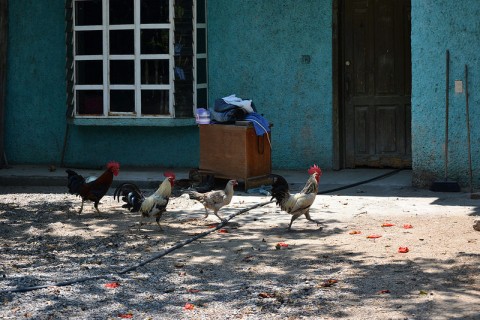At daybreak, when your mother brings you a café con leche, then asks if you have a moment, slide a chair over and say, “For you. Always.”
She doesn’t need to know the ins-and-outs of the ongoing investigation, all the ways your brother incriminated the family. She doesn’t need to know that everything is on the line: the house, the cheap festival artwork, the view of the golf course.
Lie because your mother deserves better, this miracle of a woman who survived Cuba’s special period only because, starving, she placed her family and her faith in the expanse of the Florida Straits—a woman, widowed, who sits before you in the very gown she wore to sea, her only Cuban possession, washed so many times it’s as frail as a tissue.
When she tells you that there were brothers before you, don’t follow up with a question. Listen. Allow her to unfurl the photo album, pictures of two little boys, treasured—wild boys with sticks in their hands and ash streaks across their faces; boys, who in one photo, seem tucked into bed. No. On that yellowed photo paper, they’re dead. Imagine them beneath the ground that way, tucked in caskets, waiting for your mother to awaken them with her confession.
Find her on the lanai, peeling a mango with a small knife, letting the juice drip off her elbow and onto the pavers you just had pressure cleaned. When she cuts you a piece of the fruit, offers with the knife, don’t eat it—her little slice of sunshine, fruit from Publix, but which might as well be from el campo, the hundred-year-old tree in Guanajay that she’d sit under as a child, where, learning to crawl, she’d drag herself towards the fallen fruit to suckle among the flies.
Instead, tell her “What am I supposed to do with this information, Ma?”
Then, feeling your indignation, let her have it, but know that she will not hear your words; this woman, who has survived a dozen hurricanes, will only feel the breeze on her skin.

Notes from Guest Reader Sharmini Aphrodite
So many little details in this story carry a lifetime (‘a woman, widowed, who sits before you in the very gown she wore to sea, her only Cuban possession, washed so many times it’s as frail as a tissue’). The writing is melancholic, with the future of the narrator’s brother bleak, but history’s light shines through in things that would otherwise seem insignificant — a piece of fruit, a streak of ash. It’s a brief work that carries an entire world.


 The SmokeLong Grand Micro Contest (The Mikey) is now an annual competition celebrating and compensating the best micro fiction and nonfiction online.
The SmokeLong Grand Micro Contest (The Mikey) is now an annual competition celebrating and compensating the best micro fiction and nonfiction online.